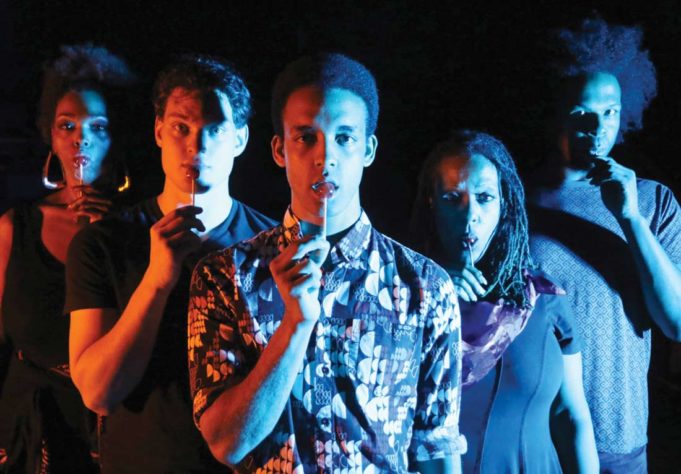Since my other duties at this publication leave me too busy to go to stage shows on a weekly basis, I thought I’d take the opportunity to take in both of the plays currently running at Stage West and write them up for you in one piece. Wildly different as they are, they both offer rewarding stuff to the curious theatergoer.
The uneven and raucous Bootycandy opens with five seemingly unconnected sketches, the first one with a little boy (Aaron Green) asking about his penis and his mother (Natalie Wilson King) giving the play’s title as a euphemism for that body part. The second and by far the best one features a black preacher (Djoré Nance) reading a letter from the pulpit expressing parishioners’ concern about homosexuals in the church choir. You may or may not be able to see the twist coming in the sketch, but Nance’s energy and brio make it riotously funny regardless. The fifth sketch, about a white man (Justin Duncan) confronting an unseen — but implied to be black — mugger, emerges as a loud misfire, but the effect of this is mitigated by a sixth sketch that rounds out the first act and reveals the previous playlets to be the works of different writers appearing at a conference of black playwrights presided over by a clueless moderator (Duncan again).
Director Akin Babatundé has usually worked for Jubilee Theatre, and he brings the same dexterity that he showed there over to Stage West, with most furniture being carried onto the set (either by stagehands or the actors) and revolving panels suggesting either a cramped kitchen or a tropical beach as the scene dictates. He elicits stellar efforts from all his actors, including Liz Mikel as a woman talking to one of her sisters (King again) about a relative naming her child Genitalia, a sketch with an incredibly hackneyed premise that nevertheless manages to work. Green does his part to hold things together as the only actor playing a single role, a young man named Sutter who comes to terms with his sexuality as he grows, and he shows off some snazzy dance moves during the show’s concluding Michael Jackson tribute.
For all that, Robert O’Hara’s play keeps winding up to make a big statement about race and sexuality without ever actually saying anything. The final sketch with Sutter showing pictures on his iPhone to his old grandmother (Nance again) particularly feels like a missed opportunity to comment on how society has changed for African-Americans and gays in recent decades. Still, O’Hara’s comedy hits home often enough to make Bootycandy a success in its regional premiere. As the preacher says, “When I was a child, I spoke as a child and reasoned as a child. But then I became a man, and I went on the internet, and I spoke as a child and reasoned as a child.”
Stage West maven Jim Covault designed the set for Bootycandy, but he stars in An Iliad, and if you ever wanted to see this veteran actor portray Achilles, Hector, Priam, Helen, and all the rest of those figures from the Trojan War, you are in luck. Lisa Peterson and Denis O’Hare adapted this for the stage from Mark Fagles’ widely read translation of Homer’s epic poem. It takes place in Stage West’s Cafe & Gallery Studio Theatre space on a bare stage littered with detritus: a pile of broken wood planks, empty crates for sitting on, suitcases full of somber men’s suits, a giant scaffold in the back. A cellist (Jordan Jones-Cleaver) takes up a seat on a balcony removed from the action, providing musical accompaniment and occasionally slapping the instrument with her hands for a percussive effect. When he’s not inhabiting Homer’s various characters, Covault takes up the persona of a weary, tequila-swilling narrator with a hand tremor who witnessed the war’s heroic and horrible deeds and remembers too much of them.
Homer purists may quail at the vernacular touches that this adaptation resorts to, but the references to mundane objects in our modern lives effectively bring home the creators’ point that these figures from Greek mythology aren’t distant from us, they’re every soldier in every war ever fought. So it’s disappointingly unsubtle when the narrator drops white stones onto the floor while listing all the great wars right up to Iraq and Syria in our day. This point is better illustrated in Covault’s performance, turning gossipy when he discusses Patroclus as Achilles’ friend (“That’s what we’re supposed to say.”) and building up thrilling momentum as he tells of Patroclus’ murderous rampage through the Trojan ranks. As the school year recommences, An Iliad is a great chance for students to get a head start on their classics studies, but it’s also a stark reminder of the marks that war leaves on its survivors.
[box_info]Bootycandy
Thru Sep 11. Stage West,
821 W Vickery St, FW. $17-35.
817-784-9378.
An Iliad
Thru Sep 18. Stage West,
821 W Vickery St, FW. $10-35.
817-784-9378.[/box_info]













Just a correction, AN ILIAD takes place in Stage West’s Studio Theatre. The Lobby Cafe/Gallery is open for pre-show dining and art as usual.
Sorry for the error. It has been corrected.